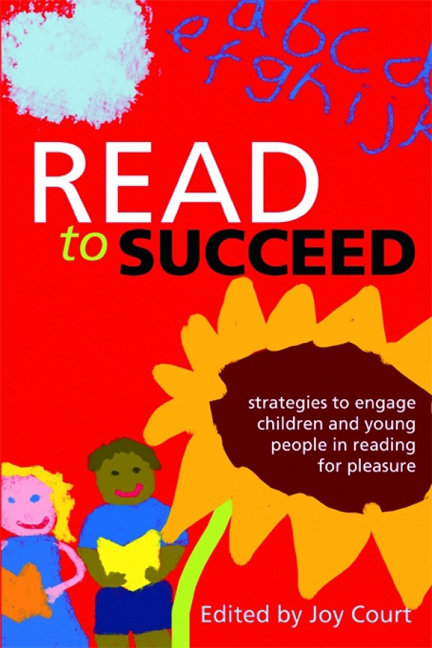Book contents
- Frontmatter
- Dedication
- Contents
- Foreword
- Contributors
- Introduction
- 1 It's never too soon to start
- 2 How children begin to read
- 3 Creating young readers: teachers and librarians at work
- 4 The six dimensions of the ‘honeycomb’ model, and its implications for literacy, libraries and literature in New Zealand
- 5 The Summer Reading Challenge in libraries: a continuing success
- 6 Stockport does Book Idol! A case study linking libraries and schools to inspire reading for pleasure
- 7 There and back again: restoring reading to the classroom
- 8 Promoting excellence: shadowing the CILIP Carnegie and Kate Greenaway Medals
- 9 Choice and motivation: local book awards
- 10 The sport of reading
- 11 Adventures in the book trade: libraries and partnerships
- 12 The hard-to-reach reader in the 21st century
- 13 Creative reading and insideadog.com.au
- Index
- Miscellaneous Endmatter
- Miscellaneous Endmatter
- misc-endmatter
7 - There and back again: restoring reading to the classroom
Published online by Cambridge University Press: 08 June 2018
- Frontmatter
- Dedication
- Contents
- Foreword
- Contributors
- Introduction
- 1 It's never too soon to start
- 2 How children begin to read
- 3 Creating young readers: teachers and librarians at work
- 4 The six dimensions of the ‘honeycomb’ model, and its implications for literacy, libraries and literature in New Zealand
- 5 The Summer Reading Challenge in libraries: a continuing success
- 6 Stockport does Book Idol! A case study linking libraries and schools to inspire reading for pleasure
- 7 There and back again: restoring reading to the classroom
- 8 Promoting excellence: shadowing the CILIP Carnegie and Kate Greenaway Medals
- 9 Choice and motivation: local book awards
- 10 The sport of reading
- 11 Adventures in the book trade: libraries and partnerships
- 12 The hard-to-reach reader in the 21st century
- 13 Creative reading and insideadog.com.au
- Index
- Miscellaneous Endmatter
- Miscellaneous Endmatter
- misc-endmatter
Summary
Introduction
Reading books for enjoyment in the classroom has been endangered by the emphasis given in the English national curriculum to reading and analysing extracts. As a result, some children may leave school without ever having read a whole book and many teachers become disillusioned. This chapter follows one young teacher's journey from the American Midwest to the English West Midlands; from idyllic teaching to disillusion in the classroom – and, ultimately, to inspiration in the library. It will examine the skills shared between teachers and school librarians, thereby empowering school librarians to be the instigators of a veritable reading revolution. And finally, it will provide practical ideas which school librarians and teachers can deploy to bring reading for pleasure back into the classroom.
First of all, let me enlist your confidence by stating my credentials. I'm not an expert in any field. I haven't won any awards. I haven't invented anything. I am married, with two small children and two small dogs. I live in a house and drive a car. I watch rubbish television and fall asleep on the sofa. I hate doing the dishes and have a minor obsession with tea towels. I'm just normal. The only thing that might separate me from most people is that I love my job. Absolutely, 100%, without doubt. Sometimes I feel guilty about saying that, like it's a confession: I'm a school librarian and I love my job.
Of course it wasn't always this way. Nine years ago I loved my job – and I was a teacher. But just one year later, still working as a teacher, I would have said: ‘I'm a teacher and my job makes me cry. Every day. I'm a total failure. I want to quit, but if I do I will be deported.’ And that lasted for nearly four years. So what had happened from one year to the next?
I had moved to England.
The teaching experience in America …
Memories are always rose tinted, so I like to believe I was a great teacher in Wisconsin. My final student teaching experience was half in a traditional high school and half in a ground-breaking charter school (these are publically funded but privately governed schools which must demonstrate success or lose their charter).
- Type
- Chapter
- Information
- Read to SucceedStrategies to Engage Children and Young People in Reading for Pleasure, pp. 107 - 130Publisher: FacetPrint publication year: 2011

